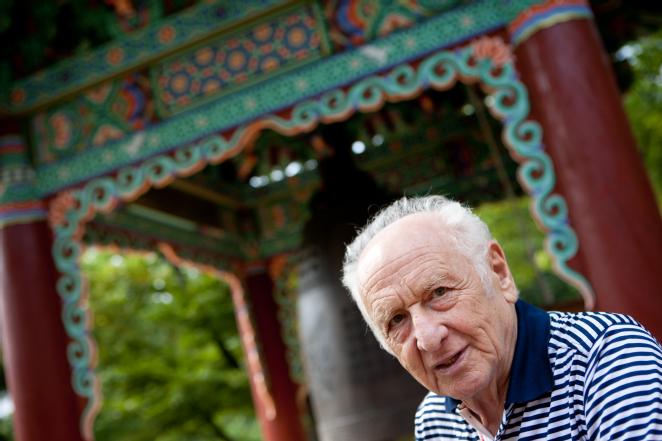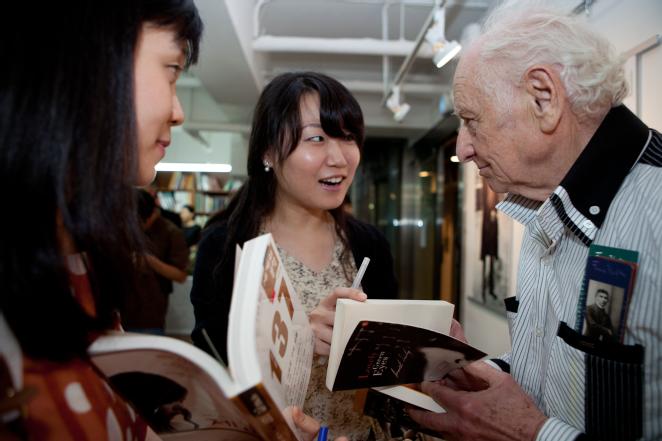서울 – 용인 – 아르노스트 루스틱 체코작가 방한
14.09.2010 / 04:36 | Aktualizováno: 01.09.2023 / 14:41
단편소설 <슈테판과 안나> 한국어 번역본 출판을 기념하여 체코의 유명 작가 아르노스트 루스틱이 한국을 방한했다. 방한에 맞춰 프란츠 카프카와 프라하 전시 개막식에도 참가했다.

foto: Björn Steinz
One of the most well-known Czech writers abroad, 84-years old Arnošt Lustig, has arrived on the invitiation of the Embassy of the Czech Republic to the Republic of Korea for a four-day trip in the mid-September 2010. He has met with his readers at Israeli Cultural Center (www.iscc.co.kr) at Gangnam on September 13, 2010. This event co-organized also by the Embassy of the State of Israel with a support of informal Seoul Literary Society, was preceded with a screening of film Diamonds of Night (1964) based on Lustig´s short story.
Arnošt Lustig, accompanied by the President of Prague-based Franz Kafka Society (www.franzkafka-soc.cz) Ms. Markéta Mališová, has also opened the exhibiton Franz Kafka and Prague at Czech Info Center (www.czechinfo.or.kr) at Hongdae on September 14, 2001 and also took part at the international conference on Franz Kafka organized by Hankuk University of Foreign Studies at their Yongin campus on the following day.
Arnošt Lustig was also promoting the very first translation of his into Korean. His story Štěpán and Anna was published in the Autumn issue of Minumsa´s literary quarterly World Literature (Segye-ui Munhak). A long interview / article about his life and work was published in a leading Korean Chosun Weekly on Sept. 27, 2010.
More about
Arnošt Lustig(born 21 December 1926 in Prague) is a renowned Czech humanist and author of novels, short stories, plays, and screenplays whose works have often involved the Holocaust.
As a 15-years-old Jewish boy in then Nazi-occupied Czechoslovakia during the World War II, he was sent in 1942 to the Theresienstadt ghetto, from where he was later transported to the Auschwitz and Buchenwald concentration camps. In 1945, he miraculously escaped from a rail transport of death to the Dachau concentration camp when the train engine was accidentially destroyed by an American fighter-bomber. Lustig then succeeded to return to Prague in time to take part in the May 1945 uprising which ended the World War II.
After the war, he studied journalism at Charles University in Prague. He was a war correspondent during the Arab-Jewish conflict which gave birth to the State of Israel in May 1948, later he worked for various Czech media. Following the Soviet-led invasion that ended the political reforms of the so-called Prague Spring in 1968, Lustig left Czechoslovakia, and via Italy, Israel and Yugoslavia he got to the United States in 1970. There he taught at universities and wrote many of his books.
After the fall of communism in 1989, he divided his time between Prague and Washington, D.C. Following his retirement from the American University in 2003, he became a full-time resident of Prague. He was honored for his contribution to Czech culture on his 80th birthday in 2006 by president Václav Havel. In 2008, Arnošt Lustig became the eighth recipient of the Franz Kafka Prize.
His books and short stories were published in some twenty languages, most recently in Chinese and Korean. The most well-known Lustig´s books are A Prayer for Katerina Horowitzowa (1964, nominated for a US National Book Award in 1974), Dita Saxová (1962), Night and Hope (1957), and Lovely Green Eyes (2000). Five of his books has been filmed both in Czechoslovakia and the United States.
Arnošt Lustig is also a founding member and honorary president of Franz Kafka Society.

foto: Björn Steinz




